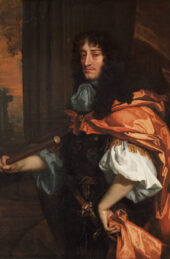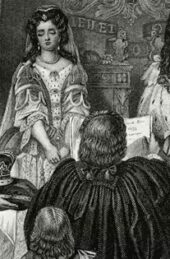If a hero is a person who is greatly admired for their courage, outstanding achievements or noble qualities, then the phrase “folk hero” has a slightly different emphasis. A folk hero is someone who is popular with and respected particularly by the ordinary people. Such a definition fits Eleanor Gwyn very well.
“Pretty, witty Nell,” as she was described by Samuel Pepys, was born in about 1650 during the Cromwellian Commonwealth. No fewer than three places claim to be her home town – Oxford, Hereford and London – which in itself is testament to her popularity. Everyone wants a piece of Nell Gwyn folklore and these cities lay claim to her without proof that she was born there. What is known, however, is that the death of Nell’s soldier father Captain Thomas Gwyn, in a debtor’s prison, left the family destitute when his daughters were very young. Rose Gwyn was later to claim that her father had been a royalist who had spent all his substance in support of Charles I during the Civil War; it was a common enough story of families left penniless and ruined in the aftermath.
The widowed Helena Gwyn took her two small daughters to London, where she worked in a brothel and where Nell and her elder sister Rose sold “strong waters” ie: alcoholic drinks to customers from a very young age. Neither of them received any formal education. Nell is known for being an “orange girl” at Drury Lane theatre where the pretty, scantily-clad women would carry notes between gentlemen in the audience and the women backstage whom they wanted to woo, as well as selling fruit and sweetmeats to the crowds. But Nell had grander ambitions; although barely literate she wanted to act on the stage rather than merely serve the audience.
Nell Gwyn was one of the first English female actors who emerged in Restoration London after King Charles II made the radical decree that female roles must be played by women rather than men. This was a seismic change in the condition of women, providing them with a new career opportunity and the chance to control their own lives to a degree. Many but not all combined it with sex work, but the most significant feature was that to be an actress was a to have a recognised profession. Some other European countries had been considerably quicker than England in establishing the role of the female professional actor.
In 1663 Thomas Killigrew established the King’s Company of actors and opened a new theatre in Brydges Street which was later rebuilt and renamed the Theatre Royal, Drury Lane. By 1664, Nell Gwyn was an established member of the cast and from the following year her acting career went from strength to strength. It was generally felt by Nell as well as her adoring audience that she was not suited to serious roles and the evolution of the Restoration comedy was the perfect vehicle for her talents. She soon became a leading London actress renowned for her wit and comic timing, her singing and her dancing. That she was referred to by Pepys and others simply as “Nell” with no addition of a surname suggests that as is the case with some modern celebrities, she was so well-known that one was not needed and that her fame existed outside the theatrical world as well as within it.
Nell Gwyn’s theatre career was relatively short. By 1668 she had caught the eye of King Charles II, and she retired permanently from the stage in 1671. The King, a great patron of the theatre, had relationships with a number of actresses but Nell was to become one of his most popular mistresses and a permanent fixture in his life. She bore him two sons. She articulated one of the reasons for the longevity of their relationship when Charles died in 1685. “He was my friend,” she said. It was companionship, humour and plain-speaking that King Charles valued in her alongside their romantic liaison.
Nell’s rivalries with some of the other mistresses of the King contributed to her legend. She allegedly administered a laxative to Moll Davis via a piece of cake in order to ruin a tryst with the King. Although she saw Louise de Kerouaille as her greatest rival and made fun of her, the two also became grudging friends. Nell, however, was always assured of public support against Louise who was both Catholic and French. And she had a riposte for every occasion. When an angry mob attacked her carriage thinking it was Louise’s, she reproached them with: “Pray good people be civil, I am the Protestant whore.” She possessed that quality highly-prized by modern audiences who admire celebrities: authenticity. Her meteoric rise from rags to riches appeared to make no difference to her character.
This was probably the key to Nell’s popularity. Whilst both her sons were ennobled by the King, she played on her humble origins and used them to her advantage. Her language, as Louise de Kerouaille snootily observed, was still that of an orange-girl. In her efforts to have the King grant her elder son a title, it is said she called the child over and said “Come here, you little bastard, and say hello to your father.” When the King protested, she pointed out that he had given her no other name by which to call him, whereupon the King created him Earl of Burford. Another even more hair-raising tale, tells of Nell holding the child out of a first-floor window and threatening to drop him unless the King gave him a title. This is another facet of the creation of a folk hero – many of their deeds are exaggerated as part of their legend. The stories grow by repetition and become embedded in the public consciousness.
Nell’s success as an actress and the way in which she ensured her own financial security and that of her children demonstrates a sharp business mind. In 1671 Charles granted her the lease of a townhouse in Pall Mall. Unhappy that she did not own the property outright she petitioned for it to be granted to her with the characteristically witty line that “she had always conveyed free under the Crown, and always would; and would not accept [the house] till it was conveyed free to her by an Act of Parliament.” In 1676 she gained her wish. Another story, possibly apocryphal, was that whilst staying at a hunting lodge in Sherwood Forest, King Charles promised to give Nell “all the land she could ride around before breakfast.” Knowing that she was no great rider and preferred to get up late he may have thought this a safe bet. However, Nell was equal to the challenge and rode out early, dropping handkerchiefs to mark out her route and claim the estate.
King Charles II died in 1685 and Nell Gwyn survived him by only two years, dying in March 1687 at the age of about thirty-seven. Her younger son died when he was only six years old but the elder, Charles Beauclerk, 1st Duke of St Albans, went on to produce twelve children, Nell’s grandchildren. Their direct descendent, Murray De Vere Beauclerk, is the 14th and current duke. Arguably a greater achievement than founding a dynasty, however, was the role that Nell Gwyn played in opening up the stage for professional female actors. For a woman with no formal education to rise to the top of a new profession and achieve such success and fame was phenomenal. Nell Gwyn cannot be called a feminist but she was a woman of wit and determination whose rise was very much against the odds. The London crowds adored her because she had risen from the streets to the heights of riches, a Cinderella-type character but with more self-determination. Once there, she had not forgotten her roots but valued and celebrated them. She was authentic and remained grateful to the people of London who had taken her to their hearts.
It is one thing to be a “hero” in one’s own time but for the legend to endure and evolve requires a different type of fame. There are plenty of historical characters who were lauded in their era and yet are now forgotten by history. Each successive generation re-interprets hero legends to suit their own needs. The stories provide a way for people to feel rooted in a community and in its history. Nell Gwyn is still regarded by many as the embodiment of the spirit of her age, Restoration England in all its flamboyant, bawdy glory. But in the present age, which values female self-determination and self-expression, Nell Gwyn is also an example of a woman who transcended her origins and the restrictions of the period to carve out a path for herself and exercise some control over her own fate.
Nicola Cornick is a bestselling novelist and the author of The Other Gwyn Girl.







